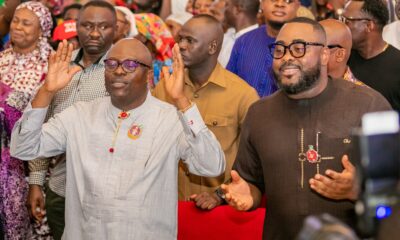Business
Strengthen Credit Control Units, Insurance Coys Told
Determined to put an end to the problem of outstanding premium in the nation’s insurance industry, the insurance companies operating in the country have been advised to strengthen their credit control units to improve premium collection process.
The Accounting Technical Committee (ATC) of the Nigerian Insurers Association (NIA), in its reports to the members of the association, stated that it has recommended best practices for treatment of outstanding premium in the insurance industry.
Mr. Oluwadare Emmanuel, chairman, ATC, pointed out that, “the Accounting Technical committee examined the impact of the write off the outstanding premium of more than 365 days on the financial result of insurance companies and suggested that the credit control units of insurance companies should be strengthened to improve outstanding premium collection process”.
The committee also proposes that the production of marketers should be based on cash collection and a common software for capturing insurance transaction should be developed for insurance companies.
The problem of outstanding premium has continued unabated in the insurance industry in spite of the fact that section 50 of the Insurance Act 2003 provides that insurance companies should desist from granting insurance covers if the required premium has not been paid.
Section 50 of the Insurance Act states that, “The receipt of an insurance premium shall be a condition precedent to a valid contract of insurance and there shall be no cover in respect of an insurance risk, unless the premium paid in advance”.
As insurance companies have always claimed that majority of these outstanding premium are being owed by the insurance brokers, who indulge in the habit of not remitting premium to the insurers, both are at loggerheads with each other.
The NIA is said to be compiling list of insurance brokers that have not been remitting premium collected on behalf of insurance companies to the insurers as required by law. The association actually sent circulars to its member companies to finish it with names of insurance brothers that have been found wanting in the area of remittance of premium.
However, the Nigerian Council of Registered Insurance Brokers (NCRIB) has condemned the practice by some insurance companies who indulged in the habit of filling the books with false premium figures as a ploy to deceive the industry’s regulator.
Dede Ijere, president of the NCRIB, who spoke in Lagos, recently, pointed out that certain underwriters deliberately pad their books with false premium figures to deceive the market regulator, the National Insurance Commission (NAICOM) that the outstanding were actually collected but not remitted by the brokers.
Ijere noted that this practice is not only a cheap blackmail but disgusting and unacceptable, adding that “We have, therefore, complained to NAICOM and the Nigerian Insurers Association (NIA) for urgent attention”.
The NCRIB boss, who was apparently trying to exonerate the brokers from accusation of withholding of premium ment, for insurance firms, stated that the NCRIB has begun moves to verify accounts with the insurance companies.
In the light of this, the NCRIB has been discussing with the NIA, the umbrella body of underwriting firm in the country, to encourage its member companies to always reconcile their premium accounts periodically with brokers and report only the reconciled and certified figures
The NCRIB also said it has given further backing to NAICOM to enforce the no premium no cover provision in the Insurance Act 2003 to prevent a situation where insurers will continue to allege that brokers are not remitting the premium due to them.
Ijere said it has also been suggested that insurance companies should be made to present Certificate of Reconciliation to authenticate outstanding premium against any given brokers.
He, therefore, called on the underwriters for urgent resuscitation of the practice of periodic joint reconciliation with brokers in monthly or bi-monthly basis.
In case any broker is found wanting, he assured that the NCRIB disciplinary committee satisfactorily handles complaints against brokers over non-payment of premium due to the insurance companies.
Business
Tinubu’s RHI Doles Out N50m To 1,000 Kwara Petty Traders

Business
UBA To Educate SMEs, Business Owners On Withholding Tax

Business
Nigeria Losing $40b Annually From Maritime Sector – NIMENA
-

 Editorial4 days ago
Editorial4 days agoHurray, Siminalayi Fubara Is 50!
-

 News1 day ago
News1 day agoUK Appoints British-Nigerian As Trade Envoy To Nigeria
-

 Business1 day ago
Business1 day agoFG Issues 25-year Licence To 10 Gas Distribution Coys
-
Column4 days ago
Nuclear Stocks Soar on Stargate AI Infrastructure Announcement
-
News2 days ago
FG Deports 828 Illegal Immigrants, Tightens Border Security
-
Rivers1 day ago
Holy Ghost Rally, Source Of Blessings-Fubara
-
Rivers4 days ago
Group Decries Claim Over Bukuma Royal Stool
-
Niger Delta2 days ago
D’Gov Tasks APWEN, Others On SMART Goals

